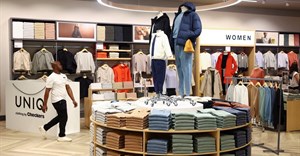
Subscribe & Follow
Jobs
- Marketing Assistant Johannesburg
- Junior Accountant George
- Fraud Analyst Johannesburg
- Vehicle Stock Controller East Rand
- Health and Safety Manager Johannesburg
- Mobile Developer Cape Town
- Head of Digital Johannesburg
- Software Developer Johannesburg
- Warrantee/Costing/Debtors and Creditors Clerk East Rand
- F & I Business Manager Rustenburg
Textile sector weathers global financial storm
Speaking at the Clothing & Textile Industries National Bargaining Council annual general meeting on Tuesday, 29 November, Davies pointed to employment numbers in the sector having increased slightly over the past year.
He said that by September 30 there were 57 728 people employed in the textile industry, slightly higher than the 56 985 in October 2010.
"This is telling us a huge story," Davies said. "As you all know the third quarter was extremely problematic for the manufacturing industries with the onset of the European debt crisis.
"The strain that was experienced by many of the industrial sub sectors was problematic and many slipped into negative territory. This industry (clothing and textiles) was not one of those," he said.
Job losses on such a scale cannot be allowed to happen again
Davies said that as afar as he was concerned the Production Incentive Model that had been applied to the clothing and textile industry had helped this and that it would be applied to other manufacturing sectors.
Referring to the onset of the 2008/09 recession when the country lost up to one million jobs, Davies said the biggest casualty then was the manufacturing sector, that had contracted by 200 000 jobs.
"We cannot afford for this to happen again," Davies said.
He went on to say that the medium-term budget policy statement had announced additional competitiveness incentive measures that would be followed through in the national budget of 2012 and that the lessons from applying the incentives used in the clothing and textile sector could be generalised and applied to other manufacturing sectors.
Companies take up incentives
Davies said that 105 companies had taken up the incentives in the competitive improvement program to the value of R112m.
The production incentives, that came into existence from April 2011 to October 2011, resulted in 199 companies benefiting and the approvals amounted to R624m.
"This is to get manufacturers to invest and raise their competitiveness. No longer can they just sweat the assets, running the factories until no longer possible and then fire the workers," Davies said.
He also pointed that the Preferential Procurement Framework Regulations would come into effect from 7 December.
These, Davies said, would allow government procurement officers to purchase locally manufactured workwear, bedding and linen.
Davies said social partners such the trade unions had also committed themselves to buying promotional material such as T-Shirts locally and that business had agreed to review its own procurement policies.
Source: I-Net Bridge

For more than two decades, I-Net Bridge has been one of South Africa’s preferred electronic providers of innovative solutions, data of the highest calibre, reliable platforms and excellent supporting systems. Our products include workstations, web applications and data feeds packaged with in-depth news and powerful analytical tools empowering clients to make meaningful decisions.
We pride ourselves on our wide variety of in-house skills, encompassing multiple platforms and applications. These skills enable us to not only function as a first class facility, but also design, implement and support all our client needs at a level that confirms I-Net Bridge a leader in its field.
Go to: http://www.inet.co.za












